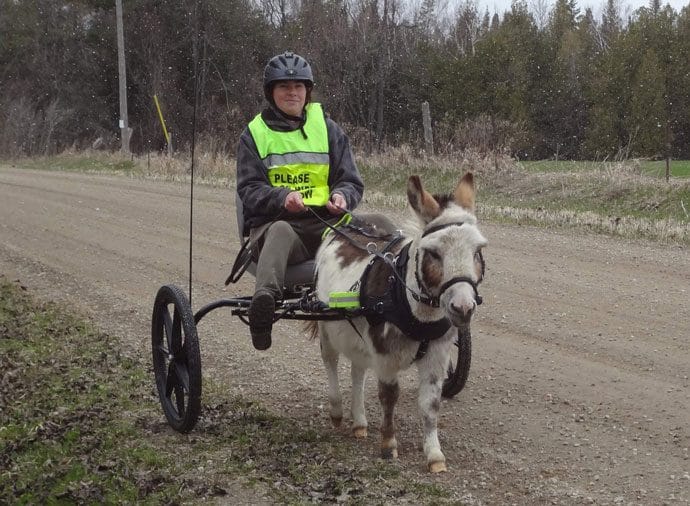WELLINGTON COUNTY – Spending time with horses can reduce stress, bring joy, increase physical exercise and time outside, and provide a sense of purpose.
But not everyone can afford the hefty price tag of ownership, leasing, or lessons.
Instead, people can spend time with horses – and contribute to their community – by volunteering.
Equine volunteers include seniors finding ways to fill their days, newcomers seeking community and connection, young people gaining experience, and students completing the community service hours they need to graduate.
Volunteers and coordinators at Willowcrest Farm in Moorefield, Equine Erin, and Sunrise Therapeutic Riding & Learning Centre in Puslinch spoke with the Advertiser about volunteer opportunities and benefits.
Willowcrest Farm
Willowcrest Farm is a lesson and boarding farm owned by Julie Diamond. There are 30 horses, goats, potbelly pigs, chickens, cats and dogs.
Julie and Audrey Hunter are a mother and daughter who volunteer at Willowcrest.
“It’s always just fun to hangout with the horses,” 14-year-old Audrey said. “Once you get to know the horses it gets even more fun because you start to get to know all their quirks.”
Audrey has been visiting the barn since she was three years old, and started volunteering at 12.
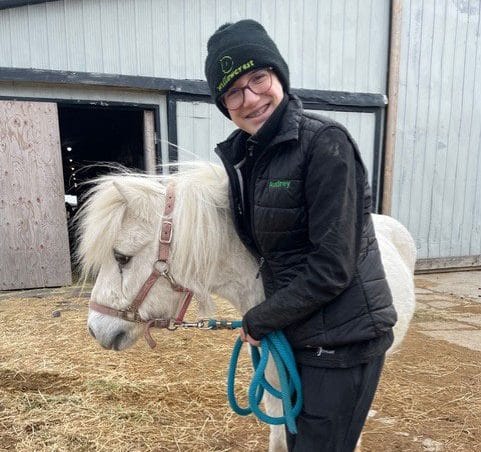
Volunteer Audrey Hunter bringing Monty into the barn for the night at Willowcrest Farm. Submitted photo
The horses can sometimes be pretty silly, she said, making memorable moments.
“This one horse we have named Cricket – one day there was a cat that walked by in the arena and [Cricket] was in a goofy mood, and he just leaned down and licked the cat,” Audrey laughed.
The Hunters muck stalls, turn horses in and out, fill feed and water buckets, and help with farm maintenance like repairing fences and raking the arena.
Audrey also grooms the horses, helps with summer camps, and prepares horses for lessons on Saturdays, during which she leads the beginner riders.
Julie Hunter said their love for Julie Diamond led the Hunters to volunteer: “We love her and she needed help.” Hunter said. “Nobody succeeds alone, right?”
Willowcrest “is just so good for the kids and for the animals,” she added, and “we feel really strongly that it’s important to give back to your community – and [Julie Diamond] does so much for the community.”
“I started riding with Julie when I was four or five,” Audrey said, and “Julie does so much for us so I wanted to help her out.”
Audrey said volunteering at Willowcrest has strengthened her work ethic, as it’s crucial to ensure the horses’ needs are met.
Julie Hunter learns a lot during her time volunteering at Willowcrest too – “I know more about horses than I ever, ever thought I would,” she said, and it’s also a great workout.
Volunteering at Willowcrest is a bonding experience for Audrey and her mom, as it gives them time together and something in common.
Audrey has also formed strong friendships with peers at Willowcrest.
Julie said “everytime you go out there, you leave and feel like you’ve accomplished something – big or small … I never walk away and think ‘oh that was a waste of my time.’”
The work can range from getting a messy barn into spick-and-span condition or something more significant – like when the neighbour’s horses got loose.
“If we hadn’t been there to catch them, what would have happened?” Julie pondered.
To enquire about volunteering at Willowcrest Farm, email Julie Diamond at willowcrest2008@gmail.com. Volunteers at Willowcrest need prior experience with horses.
HorseDay Erin and the Erin Fall Fair
Bridget Ryan has lived and volunteered in Erin for 25 years. She’s the founder of Equine Erin, the organization that hosts HorseDay Erin, and the associate director of the Erin Agricultural Society, which organizes the Erin Fall Fair.
Both annual events depend on volunteers, and volunteering is a “good way to create community and create connections,” Ryan said. It’s also “a good way to share skills, and it helps get the job done.”
Ryan said many locals “get teary eyed when they talk about [the Erin Fall Fair]. It’s been going since 1850 and has a long history of bringing communities together and showcasing rural lifestyles.”
The fair is Oct. 6 to 9, but volunteers are needed from Oct. 5 to 10 for set up and tear down.
The fair has more than 100 volunteers, with some bringing heritage draft horses, ponies, donkeys and other animals with them to the fair.
In previous years the fair has been 100% volunteer run, but this year hired a fair manager – Joanne Gregson.
“Joanne gave back for many years as a volunteer,” Ryan said, and her new position as fair manager is “a win-win for the fair because she has such a depth of knowledge.”
HorseDay Erin is an annual event that “would not run without 30 plus volunteers,” Ryan said.
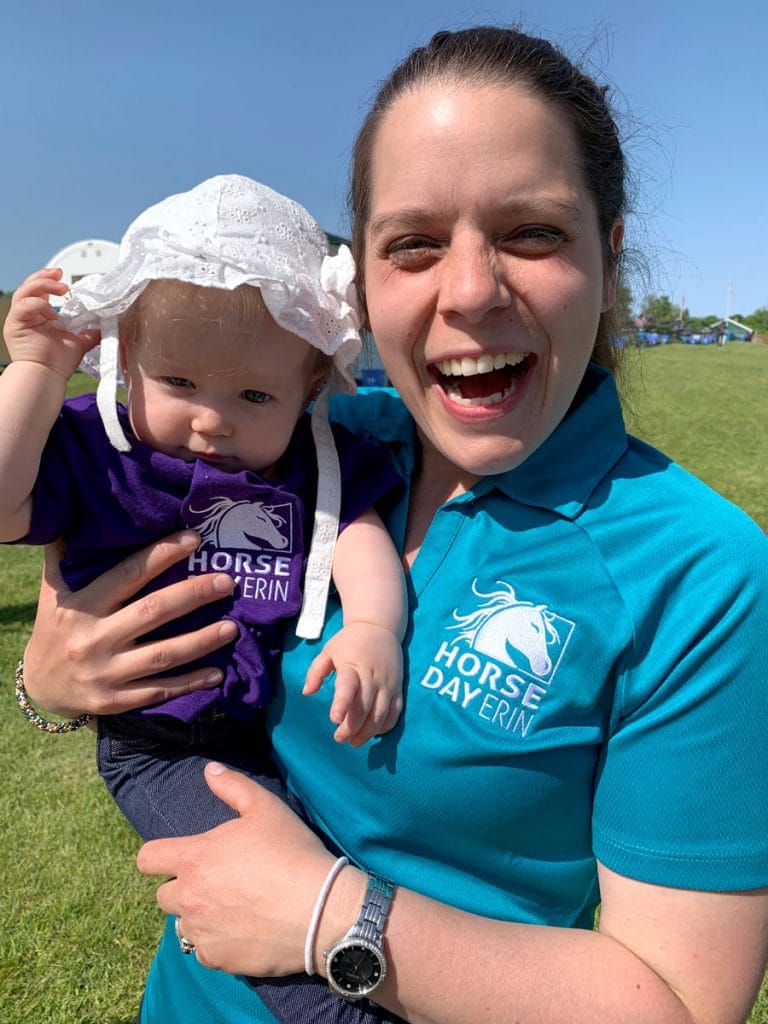
tor Fiona Ryder said “I think getting outside is everyone’s most favourite activity – volunteers and riders alike.”; Brittney and Abigail were the volunteer coordinators for HorseDay Erin and managed the volunteer team for the entire event at the Erin fairgrounds. Submitted photo
Volunteer roles include the organizing committee, distributing marketing materials, setting up for the event, and tearing down afterwards.
Next year, HorseDay Erin will take place on June 1 at the Erin fairgrounds.
Equine enthusiast and donkey wrangler Taylor Valentine has volunteered regularly at both HorseDay Erin and the Erin Fall Fair.
She brings her donkeys, challenging misconceptions.
“I really love educating people about these wonderful, misunderstood animals,” Valentine said, and she’s “trying to fight all of the old wives’ tales and myths around them.”
“They are really like a big dog,” Valentine said, and once given a chance to meet them “a lot of people really and truly love them.”
Valentine finds volunteering rewarding, and her donkey Chip does too – “There’s nothing a donkey loves more than getting attention all day.”
Valentine assures “you don’t need to have a lot of money to do this kind of volunteering, you just need the passion!
“I don’t own a farm, I work a regular full time job, but it’s so worth spending my time doing this kind of outreach. Any bit of difference I can make to improve the welfare for donkeys and mules, and any smile we can put a face on is all worth it!”
People interested in volunteering at the Erin Fall Fair or HorseDay Erin can email Ryan at equineerin@gmail.com.
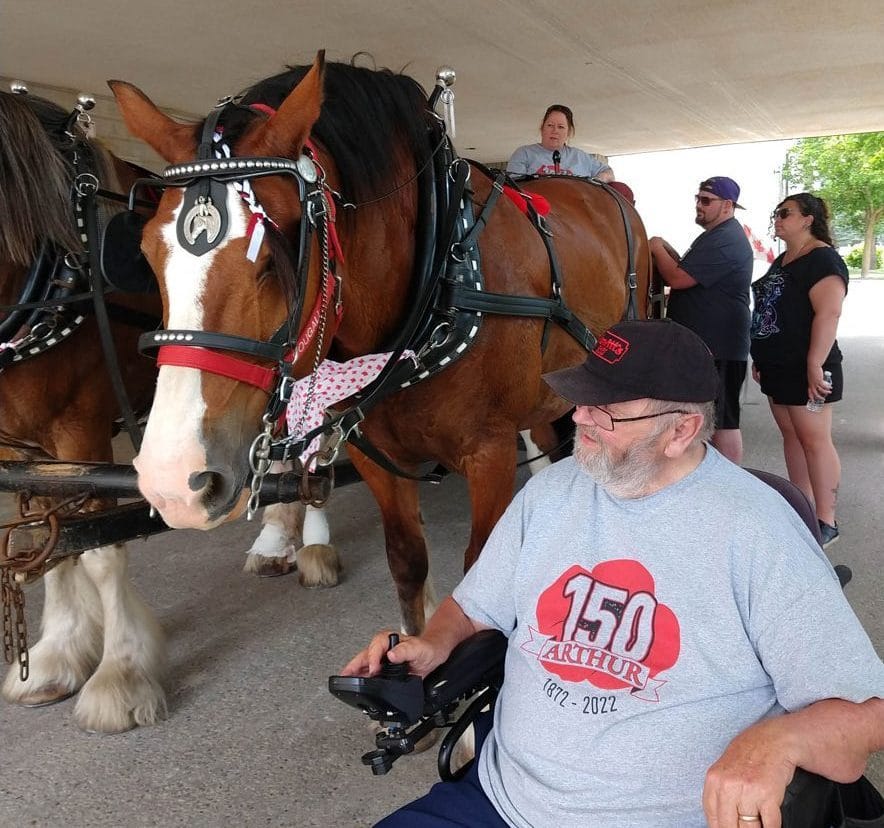
Before Gerald was confined to a wheelchair, he had his own team of Belgians. Gerald has a special rapport with Dougall from Windy Acres Wagon & Sleigh Rides, a regular volunteer at the Erin Fall Fair and HorseDay Erin. Submitted photo
Sunrise Therapeutic Riding & Learning Centre
Sunrise was founded by Ann Caine in the 1970s, with a few horses and a dream to support disabled children with equine therapy.
The centre has grown into a year-round facility with a climate controlled arena and 23 horses, depending on over 200 volunteers to offer camps, riding lessons, and other programs for children and adults with special needs.
“We could not run Sunrise or any other therapeutic riding without volunteers,” said volunteer coordinator Fiona Ryder in an interview with the Advertiser out on the farm on a warm, late-summer day.
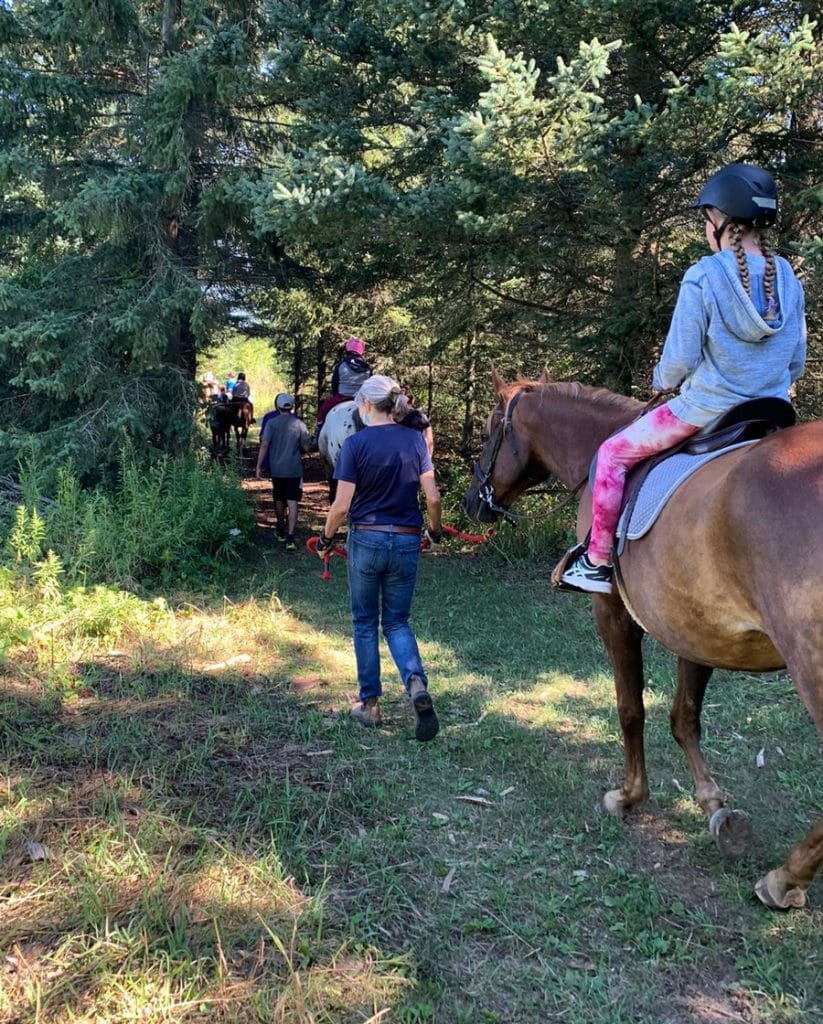
Volunteers join horses and riders on a walk through the trees at Sunrise Therapeutic Riding and Learning Centre. Volunteer coordinator Fiona Ryder said “I think getting outside is everyone’s most favourite activity – volunteers and riders alike.” Submitted photo
Most volunteers walk with a horse and rider during lessons – one leading the horse and one walking alongside the rider.
“It’s such a safe environment for kids to learn how to ride,” said longtime volunteer Martha Collins.
Collins completed her volunteer training in 1987, as “a way to be with horses and help out kids as well.”
I just liked the environment at Sunrise, so I stuck with it.”
Laura Bailey began volunteering at Sunrise about 10 years ago because she “wanted that horse connection again,” after having horses earlier in her life.
Collins and Bailey mostly lead horses during lessons, but also do some side-walking as needed.
Sunrise provides training for volunteers, but Ryder said the leaders are people with prior experience with horses.
No experience is necessary for side-walkers, just confidence walking beside a large animal. And “sidewalking is just as important as leading,” Ryder noted.
Leaders and side walkers commit to one session at a time (volunteering two hours a week for eight-12 week periods). This commitment provides consistency for the riders, who often look forward to seeing the volunteers each week.
“People come out for the horses,” Ryder said, “but they stay for the kids.”
Volunteers see how therapeutic riding impacts the students, who gain confidence, strength and skill.
“And it makes them so happy,” Collins added. “Most of the kids at the end of every lesson are just so happy.”
“I didn’t realize how much of an impact it would have,” Bailey said, but it was eye opening seeing how the students progress and their expressions when they learn something new.
“You see them open up, or start to smile or laugh,” Bailey added.
And the students aren’t the only ones benefiting – “the volunteers gain almost as much as the clients do,” Ryder said, with many starting at Sunrise with entry-level abilities and eventually “becoming quite an expert.”
The exercise is a benefit too – “You are going to get your step in, that’s for sure,” Ryder said.
Some volunteers do “light housekeeping in the barn,” Ryder said, including sweeping and mucking stalls, and others work in the office, sometimes stuffing envelopes with newsletters.
There are further volunteer opportunities in the Sunrise gardens.
Corporate groups visit the farm to volunteer together, taking on pre-planned projects such as painting, weeding, or mucking out shelters.
To apply to volunteer, email Ryder at fiona@sunrise-therapeutic.ca. Volunteers must be at least 14 years old. For more information about Sunrise, visit sunrise-therapeutic.ca.



